Kerry Peresta's Blog, page 6
April 11, 2015
The Magic Dream Box

Hilton Head Sunset
Breaking up is hard to do.
Even though it could impact our lives in the most positive and fruitful way, we weren’t sure about it. Well-meaning naysayers and cloying guilt racked my brain EVERY. SINGLE. TIME. I thought about moving.
The lightning bolt gingerly poked my brain the first time we vacationed in Hilton Head, SC, but I though, naaahh – how would that be possible? Too expensive. Too isolated. Too southern. (I take that back. Can anything be too southern? No.) Too far away from two of my four adult kids that live close by (A toughie, for sure). Too much work to sell a house, and so on, ad nauseum.
I boxed the thought, tied it with sparkly ribbon, and put it on a shelf with a longing look and a promise to think about it. The second time we vacationed in Hilton Head, the lightning bolt didn’t poke, it stabbed. This is the life, my brain shouted! The Spanish moss! The friendly people! The lush, landscaped, cleverly hidden business parks amongst huge oaks and bicycle paths! The gated Plantations! Thousands of tennis courts! Lots of old people! (Threw that in to see if you were paying attention, but it’s true, and since we are old, it counts.) A zillion golf courses! (For Jim) Wine festivals! (for me) Huge literary community! The cutest and most convincing Realtor on the planet! (Ed, you know who you are.)
The cutest Realtor on the planet took us on a tour of the entire land mass – all 41

One of Hilton Head’s cool beaches.
square miles of it – and within that tour we met a sun-wizened, keeper-of-the-community-pool sitting under a huge, yellow and blue striped umbrella, in one of the gated and fabulously landscaped Plantations. She asked my husband and I where we were from. When we told her, she laughed and said she was from the mid-Atlantic region too, and the first time she came to Hilton Head, she’d packed up and moved within six months. I asked her if she had kids, and had she moved away from them? She waved a hand in a dismissive gesture, and fixed her bright, brown eyes on my face.
“You just don’t worry about all that. They’ll come. My kids were here within a year. One’s in Charleston, and the other one lives right down the road.” She shrugged. “They always come.”
I mentally tucked her words into my little dream box.
A few weeks after I returned home, I plucked the box from the shelf, dusted it off, and untied the sparkly ribbon. Inside, I found scraps of paper with scrawled words: paint, landscape update, unclutter, shampoo carpet, wash windows, clean out storage shed, clean out closets, list the house, stage the house, and on and on and on and on and…you get the idea. I threw the box on the floor. The little scraps of paper flew all over the place. I sank into my comfy recliner, 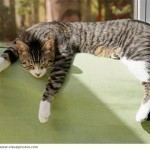 covered my eyes with my hands, and moaned in frustration.
covered my eyes with my hands, and moaned in frustration.
My thoughts ran something like this: you’re too old for a change this big, you idiot. And this: after all the work you’ve done on this place you want to leave? And this: you go to the best church ever, for Pete’s sake, or, um, actually – for Christ’s sake – how will you find another one like it? And this: it’s not time for your husband to retire, what do you think you’re doing?! How will he find a job in Hilton Head, SC, population 37,000 in the off-season? And this, the biggest one of all: how often will you see your kids?
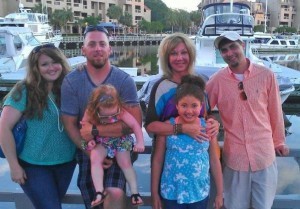
Our last HH vacay. Oh, they’ll come. Who turns down a free place to stay?
Dejected, I got down on all fours and scooped up the bits and pieces of paper and put them back in the box and put the box back on the shelf. I couldn’t find the sparkly ribbon anywhere. After stomping around my kitchen a few weeks, venting to my blessedly patient and immeasurably long-suffering husband, he started an exploratory job search, and to my surprise, found not one, but several options.
Encouraged, I made a list and chopped each task into bite-size pieces. The list stretched on for miles. I sighed, crumpled the list into a ball and crammed it in the box with the other stuff to ferment or something. Seven days later, I realized my brain had somehow tasked and calendared the work, scheduled a painter, scheduled a carpet shampoo, scheduled…well, to make a long story short, the crumpled list in the box married the tasks on the tiny scraps of paper, and voila! My dream sprouted wings.
So here I sit, one week after listing my house, painting crew and clutter long gone, mulch-and-stone landscaping update completed; waiting on the first official offer for our house.
“They will come,” she assured me. That woman’s words are now the only ones left inside the box. And be warned, Erin, Bonnie, Drew and Josiah: my dream box is magic.
February 13, 2015
Inner Cheerleader Resurrected
Today, I attempted the impossible. Well, at least I thought it was impossible.
I attended, with actual intent to participate, an intermediate Step class. I did. I really did, and it was a big deal.

I highly resent the fact that this woman still looks nearly as good as this today.

I call this one the ‘Flying high kick’. Invented it, actually.
Let me backtrack in an effort to give you a little insight. In the 80’s, 90’s, and even the early 2000’s I was a gym goddess. In the 80’s, I mastered Jane Fonda’s aerobics wearing purple tights, purple & pink striped leotard, and pink leg warmers. In the 90’s I kicked butt in Tae-Bo with Billy Bob or whatever the heck his name was. I could bob and weave and throw a punch with the best of them. At least for a girl. Advanced Step class? Bring it on! Zumba? I’m all in! Strength training? You bet.
Those were the days. Sigh.
When my fifties rolled around, so did the physical limitations. Still, I kicked and stepped and danced in gym classes anyway, consequences be damned. Except for one particular consequence that landed me in the hospital with an IV. The doctors in the ER patted me on the head and told me I needed to drink more water, but they didn’t have a clue as to why I arrived at their doorstep shaking so hard my teeth rattled, so nauseous I wanted to die. Their sugar water-IV had me back on my feet in a few hours, so I shook it off and went back to the gym.
But it kept happening. At the worst possible moments. Like the time I boarded a plane and had to be removed in an aisle-skinny wheelchair. Simple hydration did not keep the mysterious attacks at bay – my blood tests had all come back normal, so the doctors sent me home with a knowing look and a patient grin and no answers. Reminded me of my mechanic’s clueless stare when I tried to make the same noise as my sick car in an effort to explain a problem. I was determined to find out what the heck was wrong with me.
I love Google. Just sayin’.

This was my face when I thought the cheerleader had died.
All those eye-opening discussion threads about my symptoms led me to the answer: hypoglycemia. I’d never even heard of it before. Too little food, or the wrong kind of balance in the body to keep sugar levels accurate. Not diabetes, but the opposite.
Working out took a huge backseat as I figured out how to fix myself. It took four years of strict eating, and a firm commitment not to skip meals. Through experimentation, I found protein to be the most important thing my body needed, and thought about all those years – from high school and beyond – I’d starved myself to be Twiggy-thin. I’m paying the price, now. (Is it possible to be healthy and skinny? Working on it.)
So today was a BIG. DEAL. I made it all the way through the Step class, didn’t have one hint of hypoglycemia, and everybody thought I did great. It’ll take a while to remember the steps, but I’m back in the saddle, uhh…on the exercise floor, again. Before I realized the problem, in 2009 I wrote a humor column in The Capital Journal (SD daily newspaper) about working out. Here’s a link:
For previous article, click here!
At that point, I thought I was just running out of steam, and attributed the death of my inner cheerleader to aging.
NO WAY, BABY! My inner cheerleader is alive and kickin’.
God bless Google.
Amen.
December 17, 2014
A Year of Gray Days
 Many long, gray days and two weeks’ worth of hacking and sniffling have taken their toll. Plus, I dejectedly notice, just nine days until Christmas and I am, uhh…maybe halfway done.
Many long, gray days and two weeks’ worth of hacking and sniffling have taken their toll. Plus, I dejectedly notice, just nine days until Christmas and I am, uhh…maybe halfway done.
This has been a hard year in more ways than I can count. Last Christmas, my mom’s rapid descent into dementia stunned us and cast a bitter cloak over the holidays. The next few hard, sad, angry, fearful, months culminated in her June funeral. My husband had a health scare later that summer which, thankfully, turned out to be just that – a scare, but still – the anxiety was very real. The usual assortment of grown-kid-drama drones relentlessly in the background. (Why did I have four again? To my children that read this: just kidding.) The ongoing Obamacare woes that have affected my husband’s Healthcare IT-job situation has been difficult, not to mention our skyrocketing healthcare costs. Then, to top it off, I managed to contract a virus that knocked me off my feet for two entire weeks.
I have to admit, this has been a year of testing. On a scale of one to ten, a definite three. I am usually a very optimistic person. In an effort to stay that way, I recite Scriptures to myself lest I fall into the pit of despair, or the slough of despond. Which never happens, trust me. I fall into a kind of slough of irritability and criticism, which is worse. Just ask my family.
myself lest I fall into the pit of despair, or the slough of despond. Which never happens, trust me. I fall into a kind of slough of irritability and criticism, which is worse. Just ask my family.
My morning devotionals lately have been dusty and dry – more habit than delight. All those chirpy devotionals by Beth Moore or Christine Caine or Lisa Bevere or any of the latest batch of nimble-mouthed, Spirit-filled, teacher-babes just depress me. This has not been a chirpy year, and I am trying to be patient with myself. I download those devotionals to my Kindle, try them out, then delete them with an irritated swipe of my index finger, and go back to the familiar “Streams in the Desert” which is more my speed right now. Desert. Dry. Parched. Stumbling. A little lost. Grit stinging my eyes as I walk.
Depressed yet? Boy, I am. But I’m fighting it.
 It’s a good thing that I have learned not to give in to my feelings. Well, not for long, anyway. I have walked with God long enough to know that faith – the substance of things hoped for and the evidence of things not seen – is more real and substantive than my feelings.
It’s a good thing that I have learned not to give in to my feelings. Well, not for long, anyway. I have walked with God long enough to know that faith – the substance of things hoped for and the evidence of things not seen – is more real and substantive than my feelings.
My feelings tell me to second-guess my decisions, that my prayers are futile, that the gray days will continue. God says “But those who trust in the Lord will renew their strength. They will soar on wings like eagles, they will run and not grow weary; they will walk and not faint.” IS 40 Also, “Stay joined to Me, and let My teachings become part of you. Then you can pray for whatever you want, and your prayer will be answered.” JOHN 15 And finally, “God will bless you, if you don’t give up when you are being tested. He will reward you with a glorious life, just as He rewards everyone who loves Him.”
JAMES 1
I don’t know about you, but I’m all in on a glorious life!
My feelings tell me I should be worried about certain situations, try to fix them, which never ends well. If I’m not careful, I will alienate and offend rather than help. But God says “Be anxious for nothing, but in everything offer your requests to God with thanksgiving. Then, the God of peace will mount guard over your heart and mind with a peace that passes understanding.” PHIL 4
My feelings often tell me I am too old, too dumb, too opinionated, too…too whatever. But God says, “The Lord will BLESS you, if you obey His laws.” PS 128:1 “Share your plans with the Lord, and you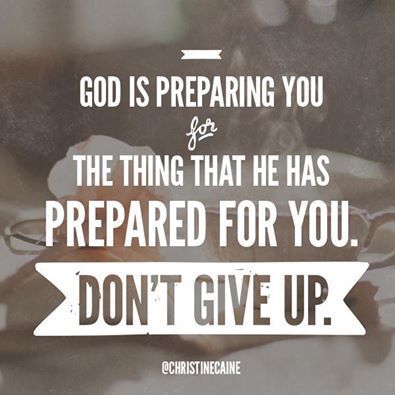 will SUCCEED.” PR 16:3 (Gosh, I love the word ‘succeed’, don’t you?)
will SUCCEED.” PR 16:3 (Gosh, I love the word ‘succeed’, don’t you?)
My feelings also plague me when my adult children struggle. Why I try to shoulder their burdens is beyond me, but they are all Christians, and God says, “You were in serious trouble, but you prayed, and He rescued you. By the power of His own word, He healed you, and saved you from destruction.” PS 107 They know how to pray. I know how to pray. Dragging around their burdens should not be an option for me. God also says, “I will teach your children, and make them successful.” IS 54 I believe this. With a defiant fist in the air sometimes, but I believe this.
Gray days come, gray days go, and eventually, the sun shines bright again. The trick is to endure the gray days, standing firm; to cast down the unruly feelings that often lie to me. Through clenched teeth, the winds of change whistling through my hair, sand stinging my eyes, I repeat to myself: “I can do “all things through Him who strengthens me.”
So, bring it, life! Bring on the gray days! With God’s word on my lips and a piping hot, fresh cup of coffee in my hand, I will run hard after that glorious life God talks about, no matter what. Unruly and depressing feelings, your days are numbered.
October 17, 2014
Beware of Disgruntled Animal Control Specialists
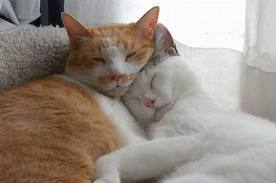
Who doesn’t love a kitty??
I don’t have a full-time job, hate housework, my kids are grown, and I am waiting on my editor to get me started on the latest draft for my next book, so…whatever. I got antsy. In order to avoid housework indefinitely and give me something to do, I visited the Humane Society.
I might not have enough cats to keep me busy, I figured. Better check and see.
I went to a Humane Society about twenty minutes from me, north of Baltimore; a beautiful drive through acres and acres of farm country. I trotted up the steep stairs to the entrance, pulled open the door, got smacked in the face by the smell of over-worked animal control specialists and under-cleaned litter boxes. That lovely smell of vaccinated, micro-chipped, neutered, needy strays pleading for a new home. I smiled.
A harried worker looked up from her desk. “Can I help?”
I told her I wanted to look at the cats, preferably under six months. She grunted, stood, and circled

No need, ma’am, to be a dragon lady…
a finger in the air.
“We’re telling everyone that animals you get from a shelter inevitably have upper respiratory issues.” She squinted at me. “Do you have animals at home?”
I told her I did, my face furrowing in confusion.
She continued, “Well, just be prepared. Your cats will get it, too.”
I was thinking, who the heck treats a potential pet-adopter like this? I asked her if she’d rather I did NOT adopt a pet, since I had a couple at home already.
She responded, “Oh, no, no, no…we just have to tell everyone.” She swiped a hank of hair off her face and crossed her beefy arms. She motioned me to follow her. I shrugged, and followed her down a narrow hall to a heavy steel door, which she opened with a jangling set of keys.
Cats, cats and more cats. Cats everywhere. I hugged myself happily – heaven in cages stacked four-deep against each wall. I wished I could take them all. Old cats, young cats; black cats, white cats and everything in between. Mewing and yowling, they squeezed themselves against the front of their cages pacing back and forth, showing off for me. I had to poke a finger in each cage and rub a nose here, a belly there.
The worker watched me, sniffed, and said, “Which one? We have to close in twenty minutes.”
Not one to make up my mind on the spot, I really had just wanted to cat-window-shop. Obviously, this woman was not in the mood to let me do that. I scooted out, disappointed because I had seen a cute, little gray fuzzball with a white nose and white paws and a steady, green gaze. Couldn’t grab-n-go, though, I needed to play with him first, so glancing at the worker, and much to her relief, I said thanks and good-bye.
A week passed. My husband left on business for a few days, and a thought wriggled through my brain: plenty of time to get a new kitten acclimated to the house!
I played tug-of-war with myself for a few hours, then got in the car and pointed it back to the same Humane Society. If the perfect kitten wasn’t there, I just wouldn’t get one.
 I was a little edgy about it, because I’d picked up the cutest kitten a few months ago that had turned out to be the kitten from hell. A feral male, I wasn’t prepared and had little knowledge of what to expect. All I knew was that he was CUTE and TINY and that’s all that mattered.
I was a little edgy about it, because I’d picked up the cutest kitten a few months ago that had turned out to be the kitten from hell. A feral male, I wasn’t prepared and had little knowledge of what to expect. All I knew was that he was CUTE and TINY and that’s all that mattered.
Wrong. Aggressive, fearful, unable to consistently use the litter box, the cute little thing mangled my other two cats and I had to take him back. So much for cute.
Still. Kitty fever is a persistent disease. Resolute, pink carrier in the backseat, I found myself driving north again.
This time when I walked in, I was prepared, chin lifted, ready to fend off unwanted upper respiratory warnings and exasperated shelter workers, but to my delight, a friendly, fun woman welcomed me like I was visiting royalty. I relaxed. She handed me off to a knowledgeable animal control specialist who let me play with as many kittens as I wanted – for as long as I wanted. The gray male I’d seen on the previous visit was gone, but there were several others I liked.
After a half hour, I’d narrowed it down to two females. One – a five-month old, gorgeous black tuxedo with wild, green eyes, two – a four-month old scruffy, gray tabby with a cute face, white paws, chest and tummy.
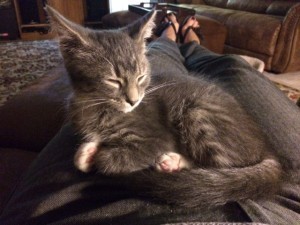
Hazel the Scruffy
Ten analytical minutes later, I left, my pink, softside, carrier bearing the scruffy one. Just a feeling.
Still, I wondered if I’d made the right decision. The other female had been gorgeous. I stared at my new kitty, and named her Hazel.
After two days, Hazel came to me when called, cuddled in my lap like she’d known me all her life, stood up to my other two cats like a pro. No accidents – she was a fastidious kitty litter box enthusiast, thank God. Not a peep out of her all night when I shut her in the bathroom to sleep so my other cats could warm up to her gradually.
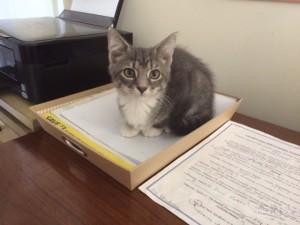
Hazel has commandeered my inbox.
It is now Day Five, and you’d swear she was part of the family. When my husband returned, she nestled in his huge hands immediately, which made him smile. I went looking for her this morning, and there she was, a tight bundle curled up in my husband’s lap. I laughed.
Moral of the story: Pretty ain’t always the best choice.
Side note: So far, no upper respiratory issues. Take that, weird and intrusive shelter worker.
September 21, 2014
From Death, New Life
It is foggy today.
I sit looking out the huge tri-paned window in my living room, separate from the rest of the house, at the magnificent wall of trees beyond. I am here every morning, praying, thinking, reading, planning. Hoping. Grateful.
Since my mother’s death, I am changed. Losing the one person that cared about every detail of my life has crumpled something inside me. Though she wasn’t perfect, and a cranky bit of work at the end – still, my soul heaved up great sorrow when I lost her. To walk through the muddle of funeral, cleaning out and selling her house, settling the estate, and all the loose ends that must be neatly tied at the ending of a life was as painful a thing as I have ever done.
But it is done. Everything is done but the grieving, and I guess that will go on and on, until I learn to live with it. A deep soft has come. Where I was hard, now I am spongy with either remorse or resilience, not sure. The quick anger that used to spurt out over hurts unimagined is less likely to spurt and more likely to sputter, now.
to live with it. A deep soft has come. Where I was hard, now I am spongy with either remorse or resilience, not sure. The quick anger that used to spurt out over hurts unimagined is less likely to spurt and more likely to sputter, now.
I hold my tongue more.
I smile at the elderly.
I thank God for every single moment, grateful I am not wheelchair-bound, or otherwise handicapped by disease.
An urgency prods. Get on with it, that thing I am supposed to accomplish before it is too late. Make the scrapbook, organize the pictures, write the book, hold your grandchildren tight, be kind to your husband, dance in the rain. Get going.
It is true that in death the seeds of new life are planted.
June 13, 2014
Aftermath
Mom on her backyard deck in Sherwood, AR a few years ago.
The aftermath of my mother’s recent funeral and the encroaching realization that I am now an orphan is settling into my bones.
In my morning time with God this week, I thanked Him for the celebratory funeral and the mass of people that attended; thanked Him for a renewed and respectful relationship with my brother and his wife as a result of sad collaborations; thanked Him for family traveling from great distances to be included in honoring my mother. I’ve thanked Him for everything I can think of, and I’m relieved that the funeral and burial are over, that she is finally at rest.
But this raw uncertainty, the gaping hole in my life – I’m grappling with it.
Perhaps there was the tiniest bit of hope that she’d recover. Even though she’d been diagnosed with late-term dementia, even though she’d become unresponsive, even though they were still adjusting her meds. After the initial diagnosis – a mere five months ago – she’d declared emphatically that she’d fight. She’d beat it, she’d said. There were ways, she’d insisted with an aggressive nod of her head. And she did. She fought until she had no breath left. She fought with every ounce of strength her frail, ninety-pound body could muster. She fought until her poor, tired, damaged brain simply gave up and she couldn’t even lift her head.
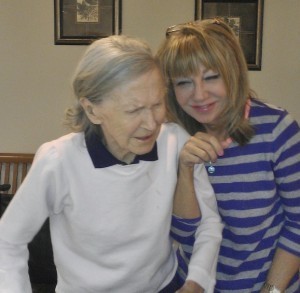
My last visit with Mom at her assisted living facility.
Fortunately, I’d flown cross-country to her facility four weeks prior to her death to visit, and she’d been somewhat cognizant of my presence. The caregiver and I brisked her around a small outer courtyard; wind blowing through her hair, hands gripping the arms of her wheelchair, eyes closed. She’d grimaced and exclaimed repeatedly, and I hoped that meant she enjoyed the stroll. I sang to her. I responded to every unintelligible utterance. For four days, I stifled tears as I hugged the tiny person that used to be my mom. We celebrated every bite she took, every swallow, every attempt at walking. I was not exactly sure that she knew who I was, but as I stroked her arm, her hand, her hair…I hoped.
The final day of my visit she seemed more alert than usual when I arrived. The caregivers had dressed her in bright colors and put a perky scarf around her neck. We took her into the cafeteria, where we spoon-fed her slowly. She loved dessert and whooped over each bite, a hint of feisty fun in her eyes. We laughed. We took her back to her room to rest. I hugged her good-bye. She clutched at my arm from her wheelchair, anxious eyes pinned to mine.
“I love you, Pan,” she said distinctly, attempting to say the name she has always called me: LeAnn.
“I love you too, Mom,” I said, tears flowing. No doubt she knew who I was. I did not realize those words would be her final good-bye to me. I cherish them with all my heart.
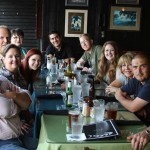
Dinner at Cajuns in Little Rock, AR with unusual large family gathering a couple nights before Mom’s funeral.
So I am left with sad memories of her rapid decline, happy memories of staying with my brother and his wife at his home when I went to visit Mom’s assisted living facility; sad memories of planning a funeral, happy memories of the way she was honored at the funeral, sad memories of my kids’ faces as they drew near to view her one last time, happy memories of my mother doting on them as they grew up. It is a curious paradox.
And I don’t know what to do with it.
For now, I think I should just let it…be.
May 8, 2014
Kerry Peresta Interview for Hampstead Magazine
An Author’s First Great Novel
Local author Kerry Peresta makes a big first splash with her first novel “The Hunting,” which appeals to women of all ages.
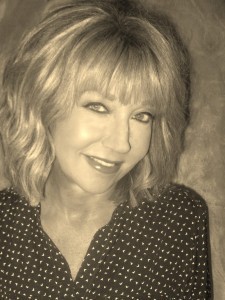 When we think of authors of great books, we very likely consider famous individuals such as J.K. Rowling, Stephen King, or John Grisham. We spot their latest best seller at Barnes and Noble or the library and flock to the theater when their story hits the silver screen.
When we think of authors of great books, we very likely consider famous individuals such as J.K. Rowling, Stephen King, or John Grisham. We spot their latest best seller at Barnes and Noble or the library and flock to the theater when their story hits the silver screen.
Some people may be surprised to discover that a great writer might live just down the street. In fact, the Baltimore area is home to a surfeit of outstanding writing talent. Ask Kerry Peresta from where she hails and she will laugh and say, “everywhere.” And while she has southern roots, and for a few winters braved the plains of South Dakota, it is the northwest corridor of Baltimore, comprised of a picturesque slice of Baltimore and Carroll Counties, that she calls home.
I draw inspiration from prayer, relationships and watching other women climb out of the ditch, whether they have been pushed or have fallen in all by themselves. —Kerry Peresta
Her first novel, “The Hunting,” was released in December 2013. Jack Downs, president of the Maryland Writer’s Association of Carroll County, calls Mrs. Peresta’s book, “a worthy read, fast-paced and uplifting… a superlative freshman novel.” “The Hunting” is the story of Izzy Lewis, a top advertising sales woman for a city newspaper. According to the book’s Amazon page, the lead character:
…has a habit of falling in and out of marriage. After her last divorce, she shoved the emotional pain into a com partment in her brain to deal with later. With three teenagers to raise, bills to pay and sales quotas to meet, introspection was a luxury she could not afford. Her mind needed a happy place. When she discovered online dating, it immediately became her favorite stress reliever and best friend. Often, she would steal into the night after her kids were asleep to meet someone new. One fateful evening, the hunt for the perfect guy took a sinister turn when the mystery man she met turned out to be her worst nightmare! Reluctantly pulled into a web of lies, Izzy is forced to confront her demons.
The genre is unabashedly chick-lit. The style is suspenseful and snarky. Customer reviews have lauded the book as “gripping, sassy, smart, and endearing.” The book is intended for women age 30 to 60, but over and over the reviewers strongly recommend “The Hunting” specifically for single moms, and here is where the author reveals her deepest motivations for writing.
Peresta is a woman with strong spiritual roots who describes her approach to life as “realism filtered through optimism.” She explains, “I draw inspiration from prayer, relationships and watching other women climb out of the ditch, whether they have been pushed or have fallen in all by themselves.” “The Hunting” reflects her strong desire to lend a hand. “I hope my characters, especially Izzy, can stir other women to have that ‘aha’ moment that leads to positive change in their lives. It’s one of the ways I hope I can help women climb out of that trough of despair,” Peresta said.
Do not be surprised to see Peresta in a local coffee shop or library – after all, she’s from the neighborhood. “The Hunting,” by Kerry Peresta, is available at Amazon, Barnes and Noble, and kerryperesta.com.
George Reagan lives in Hampstead. His website is reaganwriting.com. He is a community contributor to Hampstead Magazine in Maryland.
April 2, 2014
The Hardest Part
I am at the halfway point in my next book and it is killing me.
The middle of any undertaking is enough to send me screaming and running for the hills, pulling my hair out, yelling the futility of it.
During this stage, I usually stare at my computer screen in disgust, (like it is the computer’s fault?) walk to the kitchen and pour a cup of coffee. Then, instead of sticking to my writing schedule, a thousand myriad and sundry tasks assail my mind and pull me off course. The bills need attention, oh and did I forget to call the yard guy? and what about that trip the end of the month - ?
After I take care of some of this stuff – which is a total and completely premeditated distraction – I dutifully return to my computer. Then the second guessing begins: Why did I go down that road with the plot? Look at all the details I have to keep up with! Are you nuts? (Debatable – any writer is kinda halfway there already) Did you paint the character richly enough? Why did you decide to write a book, anyway? Who do you think you are?
 That’s about the time I need a cheerleader, or an accountability person, or an involved editor or agent. If none of these are forthcoming, I resort to blogging. At least I am writing, I tell myself, that should count for something. It’s practice, right? I’ll get back to the book. I will.
That’s about the time I need a cheerleader, or an accountability person, or an involved editor or agent. If none of these are forthcoming, I resort to blogging. At least I am writing, I tell myself, that should count for something. It’s practice, right? I’ll get back to the book. I will.
The middle of anything, for me, is the hardest part. At the least, disgruntling, and at the most, infuriating. Plus, isn’t that when many of us become discouraged and give up? How many tasks have we left undone because we couldn’t keep going through the drab and dusty middle of them?
There’s a fine line between what should be, what is, and the starry-eyed imagining of what could be. But the hard (let’s be honest) drudgery – the day-to-day implementation of necessary steps to reach the goal - that’s the rub. To keep at it. Not give up.
Persevere. That was my word last year, the one I chose from all the other worthy and appropriate words I could have chosen. And I did a lot of persevering. I persevered through editing, rewriting, the reality of publishing my first book. A mountaintop experience for sure, one which guaranteed a steep fall back to reality. And now here I am, in the middle again.
appropriate words I could have chosen. And I did a lot of persevering. I persevered through editing, rewriting, the reality of publishing my first book. A mountaintop experience for sure, one which guaranteed a steep fall back to reality. And now here I am, in the middle again.
The word I chose to focus on this year is anticipate. A hopeful word, a faith-filled word. One that assumes the best and faces the worst with optimism. Then I tripped on another middle, and tumbled into a pit of quicksand. I am not so quick to pull myself out if I am in the disorderly, sticky, jumbled middle. It doesn’t help that I tend to be impatient.
One of the psalmists said: “I patiently waited Lord, for you to hear my prayer. You listened and pulled me from a lonely pit full of mud and mire.”
And this, from James 1:2-4: “Consider it a great joy whenever you experience various trials, knowing that the testing of your faith produces endurance (steadfastness, patience). But endurance must have its entire work, so that you will be mature and complete.”
Mature and complete I am definitely not. I am willing, though. I am afraid it may take more perseverance to stumble forward toward that goal.
I think living through the middle of anything – writing a book, training a child, achieving a degree or a goal, a difficult discussion with a spouse, working toward a dream - is hard. I personally like my tasks quickly completed, successful, orderly, drama-less, and appreciated. With as little effort on my part as possible.
I know, I know…dream on.
I should probably pick up the word persevere again this year and apply as necessary. I don’t think I’m quite done with it. Until then, I will anticipate the relief I will feel when this manuscript is finished.
****************************************************************
Click here to buy my latest novel, THE HUNTING!
March 3, 2014
Wake Me Up When the World Stops Spinning

View from Bluebeard Castle, high atop St. Thomas
It wasn’t the galloping Mexico don’t-drink-the-water trots, but it was close.
Our first trip to the islands, mon! My husband and I flew to St. Thomas, U.S. Virgin Islands giddy with anticipation. In our rented squib of a car, we careened through Charlotte Amalie in search of Bluebeard Castle, anxiously avoiding a head-on with oncoming cars that obviously didn’t understand we were new to driving in the left lane. The GPS we’d carefully packed appeared to be stuck on re-route, and I finally jerked it off the windshield and stuffed it into the console.
Several stops for directions and screams to stay to the left later, we pulled into a tiny, paved lane that climbed straight up a mountain. My stomach reacted by clamping itself into a tense knot. My fingers dug into the door. I closed my eyes until we reached the top. When the car stopped, I opened one eye and uncurled my fingers from the jut that passed for an armrest on the door. My husband’s face was beaded with sweat.
“Wow! Pretty impressive!
I lay my head back and breathed deeply. He stared at me, worried. “You okay?”
I nodded. “Waiting for my stomach to settle.” I scooted up in the seat. Trite as it sounds, the view looked like a travel postcard with all the essential components: gently lapping turquoise sea, palms swaying in the breeze, cruise ships in the harbor, a centuries-old downtown bustling with activity. I smiled. “Let’s check in.”
An innocent among the natives. I did not suspect my stomach as the worst traitor on earth.

Red Hook marina
Two days passed in a flurry of exploration and excitement. On vacation, my routine was, of course, ruined. I drank too much coffee and the teensiest too much wine. I ate rich and sumptuous food with wild abandon, even (ohmigosh!) dessert! I was invincible.
The morning of our third day, we’d planned a ferry ride to neighboring St. John to enjoy Trunk Bay and shop along the waterfront. I ignored my stomach’s protests as my husband negotiated stop-and-go traffic along Havensight, executed several u-turns to change directions (no GPS, remember?), and sped up and down and around St. Thomas’ bounteous mountains. After thirty minutes, we made it to the ferry. We parked, gathered our stuff and found the ticket counter. I ignored the floating sensation in my head and the fact that my eyesight was shadowy around the periphery, determined to enjoy the day. I waved my husband to go get tickets without me, and dropped onto one of several nutmeg-colored benches in Red Hook’s breezy ferry terminal.
He returned, holding aloft two white rectangular tickets, smiling broadly. His face fell at the sight of mine. I told him I didn’t feel so good, maybe we should wait for the next ferry until my stomach behaved. He agreed, and waited with me.
I felt better after an hour, and we boarded, sitting on the top. The wind and sun on my face felt good. My husband chatted with the people around us, smiling and laughing. I could not focus on stuff close up, so at the risk of appearing rude, I kept my eyes fastened on the far coast, trusting my equilibrium to return. I am such a sucker for optimism that completely ignores reality.
 The ferry docked, gentle as a lamb, and we passengers got off in a hectic jumble, excited as toddlers. My husband hailed an island shuttle and we crowded in with an international mix of tourists. The shuttle danced over mountaintops and swung around hairpin curves. I clutched my stomach and pasted a smile on my face. After fifteen minutes of exhilarating scenery, we zig and zagged into Trunk Bay.
The ferry docked, gentle as a lamb, and we passengers got off in a hectic jumble, excited as toddlers. My husband hailed an island shuttle and we crowded in with an international mix of tourists. The shuttle danced over mountaintops and swung around hairpin curves. I clutched my stomach and pasted a smile on my face. After fifteen minutes of exhilarating scenery, we zig and zagged into Trunk Bay.
“Better?” my husband asked when my feet touched pavement and the world stopped spinning.
I nodded. “Yeah, I’m fine.”

Yours truly willing my stomach to unquease, please.
And I was, as long as I was prone on the beach.
Later, we played Frisbee in the ocean, laughing. A delightful oasis, Trunk Bay was everything I’d hoped and more. I swam and bobbed after the Frisbee. When I stumbled up on the beach a little later, my stomach was in full rebellion. I fell onto the towel, closed my eyes, and put one hand over my face. My husband, a gangly Great Dane of a man, loped to my side.
“Need anything? Hungry? Thirsty?”
I nodded. He left in search of food to quell the encroaching weirdness I couldn’t seem to tame. He returned with chicken nuggets. I gobbled them down and drank buckets of bottled water. I recognized the signs of a hypoglycemia event, a condition I’d developed but thought under control.
Right.
The trip down the mountain from Trunk Bay was the worst sort of nightmare, and I spent it lying as horizontal as possible given the crowd of irritatingly chatty tourists packed in dense as sardines. Thank God nobody tried to talk to me. When the roller coaster ride finally jerked to a stop, I plummeted from the shuttle, steps shaky and breath labored. Behind the bushes a private bit of beach opened its arms and I fell headlong into a prickly beach grass hug. My husband trotted after me, a pucker between his eyebrows, all our bags hanging off his shoulders.
“What do you need?” His hand patted me.
Pant, pant. “I don’t think…don’t know…” Pant, pant. “Just to be…still.”

Bewitching Trunk Bay
In full hypoglycemic attack now, I knew it was a matter of waiting it out. A balance of hydration and protein intake. And vomiting. Lots and lots of that. The grass didn’t mind, and I was grateful for the private spot.
“I think I’ll walk over there,” he said, pointing to the waterfront shops, “and get you some water and look for a protein bar or something.” I nodded. No man should watch his wife vomit for hours, I don’t care how wonderful the marriage is.
He was gone a good while. My stomach felt better every time it heaved, and eventually I sat up and watched the lovely afternoon clouds bunch up in fluffy palettes of blue and gray over the ocean. A huge glob of sun emerged from behind them, draping all of us, sick and healthy alike, in gold. I blew out a huge sigh of relief. My husband appeared bearing granola bars, coconut milk, and water.
He folded himself beside me on the grass. “I told the guy at the store how sick you are, he said coconut milk, it never fails.” He lifted the can and squinted at it. “Island remedy.”
I chuckled. The guy surely thought I had a hangover, which I didn’t. A combination of too-rich food, too much caffeine, not eating at regular intervals throughout the day…I knew better. But I was on vacation! Surely I could suspend the rules a little.
Apparently not.
I chugged the coconut milk anyway. In my condition, I would’ve chugged anything, and I ate the granola bars too, even though they probably had too much sugar, a big no-no for a hypoglycemic. I promptly threw everything up a few minutes later. I fell back on the ground and threw a hand over my face.

Coki Beach, snorkeling destination
“Just be still,” my husband said. To be still is his answer to any malady. “Just rest,” he said. I had no choice, and obediently rested. An hour later, on wobbly legs, we boarded the passenger ferry back to Red Hook. I tilted my head on his shoulder and closed my eyes. My stomach crossed over heaveless, a fact I found delightful. The worst is over! My soul sang its deliverance. It’s over!
I didn’t factor in a raving maniac cab driver.
Taxi drivers pecked at passengers de-boarding the Red Hook ferry like vultures sampling a carcass. Their weatherbeaten vans rimmed the parking lot. My husband strode to the first in line, explained his wife was sick and could he drive gently and carefully? Short and squat with darting, dark eyes, the driver replied in broken Island English yes, of course and waved his hand at me, then the front seat. I got in and reclined the seat.
“You need ride? Room for more? Room for more!” The driver shouted to anyone within earshot.
One of the passengers in our already stuffed van told him there was no room.
“Always room, always room!” He continued to beckon people to no avail. “Why am I always the screwed one,” he muttered under his breath, and angrily jerked open the driver door. He roared from the parking lot in a huff of smoke. I told myself to be still. My hand groped along the door for the armrest and clutched. My eyes squeezed shut. You can do this, I told my stomach.
Three minutes into the ride, screams forced my eyelids apart. Our van was heading straight into the headlights of an oncoming car! I didn’t have the energy to scream. Our driver swerved out of danger.
“S’alright! No problem!” His voice was shrill, one hand lifted, dismissive; like he intended to make a rude gesture, but thought better of it. One of the passengers talked to our driver sternly, as if to a child. I was grateful for it.
 The old van bounced around curves and bumped over potholes up and down the mountains. The driver drove like one of the islands’ famed Man O’ War birds; swooping, swerving, harassing and bullying other drivers until they got out of his way. He sniffed every ninety seconds, I timed it. Regular as a hiccup. I thought about meth addicts. I muttered, miserable, that I needed to stop. My husband, ever my valiant protector, screamed at the driver to stop. He did.
The old van bounced around curves and bumped over potholes up and down the mountains. The driver drove like one of the islands’ famed Man O’ War birds; swooping, swerving, harassing and bullying other drivers until they got out of his way. He sniffed every ninety seconds, I timed it. Regular as a hiccup. I thought about meth addicts. I muttered, miserable, that I needed to stop. My husband, ever my valiant protector, screamed at the driver to stop. He did.
I fumbled with the door, got out and lurched into the grass, my husband fast behind. The driver came around and stuck something under my nose, like smelling salts. “This make you better,” he proclaimed. “Island remedy.” I wondered how many island remedies actually existed. I dutifully sniffed. It smelled like menthol. He rubbed it under my nose. “I take care of you, honey,” he said, all sweetness and light now. “Dr. Pete, that’s me!” He put his arm around me. “Five minutes, we be there. Five minutes, dat’s all. Trust Dr. Pete!”
My husband helped me back into the van. “You can do this for five minutes,” he whispered. “Just hang on.” I nodded. The door closed with a squeak and a clunk. I lifted a shaky hand to roll down the window. The driver took off with a heavy foot and a spurt of gravel.
Ten minutes later, I realized the driver was not only a horrible driver and a possible meth addict, but a liar as well. The van lurched around a sweeping drive in front of a Marriott Hotel quite a distance from where we were staying. My husband was furious.
“You said five minutes!”
The driver waved his hand and muttered. “Everybody out that needs Marriott! Sir, we be there in five minutes. Five minutes.” He smiled. His teeth were tobacco-stained. I had to get out of that van, I knew I would throw up all over it if I didn’t. I fiddled with the door, opened it, fell into the beautifully manicured lawn of possibly the most upscale Marriott on the planet and threw up again. The world spun. I closed my eyes. The grass felt tropics-damp, and smelled of a fresh mowing. I hoped the guests could not see me. I snuggled into the grass and refused to move.
“Sir! Sir! I cannot wait!” The driver waved agitated, dark brown hands at his chariot. His eyes bulged out of his face. “I must get other guests to-”
“She can’t move! She’s sick!” I wanted to comfort my husband but my body begged to recline. I waved at him to come closer.
“Let him go, honey. I can’t take more of this right now.” I’d started shaking and quivering like a wild thing, in the throes of a full-on hypoglycemic attack. I knew it would pass, but the question was when? And how would I get back to Bluebeard Castle? The thought of another crazy cab ride inspired me to throw up again.
A large, black woman in uniform appeared like an angel, her eyes full of pity and kindness, pushing a wheelchair. “What you need, sir?” She looked at me, my husband. “Wheelchair help?”
My husband explained the situation. She wheeled me into the lobby, under a fan, in the middle of all the guests. My body shook and jiggled uncontrollably. My husband held my hand, resigned and patient. He’d been through it before, knew what to do, knew it would pass; but couldn’t speed it up. “Can we move me to somewhere more private?” My teeth chattered with all the shaking. They helped me into the wheelchair and moved me to a more private area where I could shake and shudder and throw up without curious glances. They brought me a barf bag and a peanut butter sandwich, which I’d requested. After two bites, I threw up again, and tossed the sandwich on a gleaming coffee table.
The angel showed up every ten minutes to check on us, suggested we go to the emergency room, she’d call the ambulance. We insisted it would pass, but looking at me, she shook her head and shrugged her shoulders and made huffing sounds. My husband slumped in a chair beside me, exhausted and worried. I took great, deep breaths, attempting to control the shudders and not hyperventilate. Sounds of chirpy, misbehaving children swirled around us, their parents admonishing, steps quick and fading down the hall. Random thoughts flashed through my mind, among them gratitude we’d not chosen the Marriott, a family-friendly resort hotel. Bluebeard Castle geared itself to empty-nesters which suited us fine.
After a humiliating two hours in Marriott’s lobby, I decided to travel the last leg. The Marriott angel assured us she’d located a cab that would be ours alone, the driver would drive as slowly as a sea turtle on land, and I could lay down in the back seat. True to her word, the cab ride was perfect. My husband generously tipped the driver, helped me to our room, where I fell on the bed. By that time it was nearly midnight. The shaking and shuddering had stopped, my stomach had heaved its last heave, and when I stood, the world had stopped spinning. I took a shower and slid into bed.
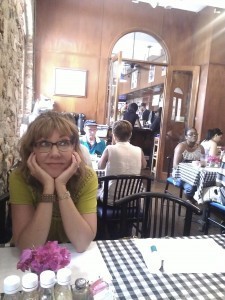
After recovering, grateful for every non-nauseous step! In Gladys’ Café in Charlotte Amalie.
The next day we immediately bought healthy food for my mini-snacks throughout the day. I gave up wine for the rest of the trip just in case, even though I’d only had one glass the first couple of evenings. I limited caffeine, refused all sugar, counted carbs, and promised God I would do better with my diet, even though it was a VACATION.
Next time, rigid diet and constant hydration will be the order of the day. Also, carefully screened cab drivers and less wild, mountainous terrain. Also, I should amputate my stomach, which would be largely preferable to giving up a glass of wine now and then.
**********
January 19, 2014
Ready, Aim, Believe!
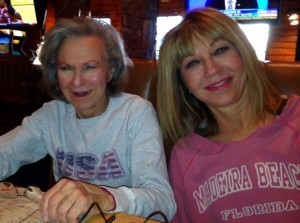 She shuffled to the door after a few minutes, her face creased with worry, and opened the blinds. Her eyes narrowed when she saw me, her eldest daughter, standing at the door, suitcase in hand.
She shuffled to the door after a few minutes, her face creased with worry, and opened the blinds. Her eyes narrowed when she saw me, her eldest daughter, standing at the door, suitcase in hand.
I waved and smiled.
She fumbled with the lock, opened the door. The house was dark, blinds tight shut. ”What are you doing here,” she barked, and shuffled in the opposite direction. I forced my smile to stay in place.
“Just missed you, that’s all,” I lied. “Wanted to spend some time with you, Mom.” I lugged two suitcases over the threshold, into the house, down the hallway, and left them in the bedroom I’d be staying in. The bedroom she’d deserted long ago, opting for a smaller one with a single bed. Safer, she’d said.
My eyes grazed the king-size bed with its enormous headboard, matching dresser and armoire, hand-picked by my parents thirty years ago. My dad had been proud, and rightfully so. For the last of seven children born to a hardscrabble depression-era farming family, he’d done well for himself. He had waved his hand expansively toward the bed, mumbling the price of the bedroom set in wonder as if he couldn’t quite believe he’d spent that much money.
The same bed in which he’d spent much of his time after multiple strokes ten years later; the same bed in which my mother had cried hard tears after he’d died, the same bed I would sleep in now.
I swept away the cobwebs in my mind with a quick shake of my head. I had business to tend to.
The call had arrived like a dreaded case of chicken pox, or policemen standing on my front steps at three a.m. Sorry, the voice had said, not good news. Your mom’s had a slight wrestling match with the car and no one knows where she’s gone. She’s not listening to us, and she’s certainly not listening to her doctor. You’d better come.
So I did. My mother was unprepared, obviously; and so was I.
The recent test results had thrown us all – her friends, family, my brother and I - for a loop. What do we do now, we moaned to one another. Surely she isn’t as bad as all that. We’ll just wait and see, we’d said, the numbness of denial taking hold. Dementia isn’t a death sentence after all, it’s not like cancer – or a stroke – or omigod a heart attack.
Then the call came. Then another, a stern voice, demanding twenty-four hour care or else. We opted out of ’or else’ and sprang into action.
At least we weren’t numb anymore.
So there we were, my mother and I; she, cranky and suspicious; me, tentative and watchful. She relaxed after forty-five minutes, showing me this and that, her sentences jumbled, her mind deciding to accept my presence at face value. My heart thumped in sad, slow beats as I listened to what my ears had refused to hear, my brain had refused to accept. Her garbled verbal misfires kept hammering, one after the other, until tears trickled down my cheeks. I quickly turned away, lest she suspect the real reason for my visit.
Two days until my brother arrived. Two entire days with Mom, knowing we were asking her to leave the home she loved, knowing there were hundreds of details to consider, knowing she could not be told the truth. Not yet. Two days and we’d descend upon her together, sorrow on our faces and love in our hearts. We were prepared for a battle, for she would not go softly, we thought.
I prayed very hard during those two days.
My brother’s arrival was much the same as mine - a light knock on the door, suitcase in hand, a puzzled expression on Mom’s face. She barked, “What are you doing here?” I crept away, out of the line of fire, relieved that my brother got the same unwelcome as I had. His arrival sparked furious questions.
“What are you both doing here?” Her eyes, fearful and anxious, darted from him to me. “What is going on?”
Anticipating a quandary, I’d prepared a meal, figuring it’s always better to get bad news on a full belly, no matter what. I signaled my brother with my eyes, he nodded and put his suitcases in the upstairs bedroom. My mother sighed and muttered and shuffled down the hall, shoulders hunched protectively.
“Smells good,” my brother intoned, when he returned.
“Thought a meal would do us good before we dive in.” His eyes canted right to the stove, then left back to mine. He nodded.
“That’ll be good. I haven’t eaten all day.”
I sighed happily. I’d made the right decision. We enjoyed lively conversation and gentle jokes. But after dinner, her pleasant demeanor fled. Her mind may have been muddled but she still recognized a plot when one unfolded right before her frosty blue eyes. She walked into the den, turned, assumed a militant stance, and jabbed a finger at us.
“This is not going to happen. If you think I’m leaving my house, I’ll sue you! I will!” She then proceeded to list other, less savory actions she would take if we were there for the reason she thought we were.
And we were.
My brother and I were stunned. We looked at each other over her 5’2″ frame. Maybe she was more determined than we’d thought? We asked her to sit and listen to us. My brother took the chair beside hers, the mauve-and-magenta-and-mustard plaid one. I squatted beside her on the floor. Her face twisted in anguish. Her arms wrapped around her thin chest.
My brother, bless him, got the ball rolling. I was grateful because I couldn’t open my mouth without sobbing. Between the both of us, we managed to convey our love, concern for her safety; to describe the lovely facility to which she would move, close to my brother’s home. We told her it was not possible for her to drive anymore, and the reasons for it. My mother cried. My brother and I cried. We hugged. Then we cried some more. Then we hugged some more.
After an exhausting forty-five minutes of explanation, assurances and promises that my brother and I did not feel imposed upon, she relented.
Then, Mom did something completely unexpected. This tiny, feisty, defiant, fiercely independent, eighty-year-old woman got up and started packing.
“I will get better,” she said, throwing clothes in a suitcase; blankets in a box. “I will get better.”
My brother and I smiled at each other. The doctor had said her condition was irreversible.
But watching her that night, I’m not so sure. I’m a believer in miracles. And for me, her reaction to our devastating news was nothing less than a miracle. Who knows? Maybe she will get better.
Way to go, God. Thanks for stepping in. And Mom, I’ve never been prouder of you.
*****************************************************************








